Phycological problems in student
咨询学业问题的英语作文
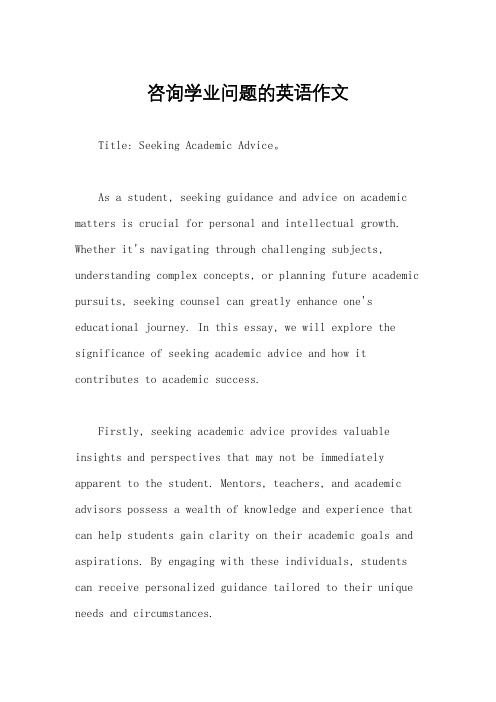
咨询学业问题的英语作文Title: Seeking Academic Advice。
As a student, seeking guidance and advice on academic matters is crucial for personal and intellectual growth. Whether it's navigating through challenging subjects, understanding complex concepts, or planning future academic pursuits, seeking counsel can greatly enhance one's educational journey. In this essay, we will explore the significance of seeking academic advice and how it contributes to academic success.Firstly, seeking academic advice provides valuable insights and perspectives that may not be immediately apparent to the student. Mentors, teachers, and academic advisors possess a wealth of knowledge and experience that can help students gain clarity on their academic goals and aspirations. By engaging with these individuals, students can receive personalized guidance tailored to their unique needs and circumstances.Moreover, seeking academic advice fosters a culture of collaboration and learning. It encourages students to actively seek help when faced with academic challenges, rather than struggling in isolation. Through open communication and dialogue, students can exchange ideas, share resources, and support each other in their academic endeavors. This collaborative approach not only enhances individual learning but also contributes to the overall academic community.Furthermore, seeking academic advice allows students to explore diverse academic opportunities and pathways. Academic advisors can provide information about different majors, minors, and academic programs, enabling students to make informed decisions about their academic pursuits. Additionally, mentors can offer guidance on extracurricular activities, internships, and research opportunities that complement students' academic interests and career goals.In addition to academic guidance, seeking advice also helps students develop essential skills such as criticalthinking, problem-solving, and communication. By engagingin meaningful discussions with mentors and peers, students learn to analyze information, evaluate options, and articulate their ideas effectively. These skills are not only valuable in academic settings but also in professional and personal contexts.Moreover, seeking academic advice fosters a sense of accountability and responsibility. When students actively seek guidance and support, they demonstrate a willingness to take ownership of their academic journey. They recognize the importance of seeking help when needed and are proactive in addressing academic challenges. This proactive approach not only enhances academic performance but also cultivates a sense of self-confidence and resilience.In conclusion, seeking academic advice is essential for student success. It provides valuable insights, fosters collaboration and learning, explores diverse opportunities, and develops essential skills. By actively engaging with mentors, teachers, and academic advisors, students can enhance their academic experience and achieve their fullpotential. Therefore, I encourage all students to embrace the opportunity to seek academic advice and leverage it to enrich their educational journey.。
大学人文学科英语作文

大学人文学科英语作文In the age of technological advancement and specialization, the role of humanities in university education is often questioned. However, the study of humanities remains a cornerstone of a well-rounded education, providing students with a broad perspective on the human experience andfostering critical thinking skills that are essential in all aspects of life.The humanities encompass a wide range of disciplinesincluding literature, history, philosophy, and the arts. These subjects delve into the human condition, exploring our past, understanding our present, and imagining our future. Through the study of humanities, students gain insights into different cultures, societies, and ways of thinking. This cultural literacy is vital in a globalized world where cross-cultural communication and understanding are increasingly important.One of the primary benefits of a humanities education is the development of critical thinking. By analyzing complex texts, engaging with philosophical debates, and interpreting historical events, students learn to question assumptions, consider multiple perspectives, and construct well-reasoned arguments. These skills are not only valuable in the academic realm but are also highly transferable to the professional world, where the ability to think critically and solve complex problems is in high demand.Moreover, the humanities cultivate empathy and emotional intelligence. By studying literature and the arts, studentsare exposed to a variety of human experiences and emotions, which can help them develop a deeper understanding of others. This empathy is crucial for building strong interpersonal relationships and working effectively in diverse teams.In addition to these intellectual and emotional benefits, the humanities also play a role in fostering civic responsibility. By studying history and philosophy, students can better understand the foundations of their society and theprinciples upon which it is built. This knowledge can inspire a sense of civic duty and encourage active participation inthe democratic process.Despite the perceived practicality of more technical fields, the humanities provide a foundation for lifelong learning and personal growth. They equip students with the ability tothink creatively, communicate effectively, and engage withthe world in a thoughtful and informed manner. In a rapidly changing world, these are skills that will serve students well, regardless of their chosen career path.In conclusion, the humanities are not just an optional add-on to a university education; they are an essential componentthat enriches the intellectual and emotional lives of students. They provide a wellspring of knowledge and skills that are valuable both within and beyond the walls of academia. As we continue to navigate an increasingly complexworld, the insights and abilities gained through the study of humanities will be more important than ever.。
怎样解决选科困惑英语作文

怎样解决选科困惑英语作文How to Solve the Confusion of Choosing Subjects。
Choosing subjects for high school or university can be a daunting task for many students. The decision can have a significant impact on their academic and professional future. However, with careful consideration and guidance, this confusion can be resolved. In this essay, we will discuss some effective ways to solve the dilemma of subject selection.Firstly, it is crucial to assess one's interests and strengths. Each student has unique talents and passionsthat can guide their subject choices. By reflecting on what they enjoy and excel at, students can identify the subjects that align with their natural abilities. For instance, if a student has a knack for problem-solving and analytical thinking, they may consider subjects like mathematics or computer science. On the other hand, if a student is creative and enjoys expressing themselves through visualarts, subjects like fine arts or graphic design may be more suitable.Secondly, seeking advice from teachers, parents, and career counselors can provide valuable insights. These individuals have experience and knowledge about different subjects and their potential career paths. They can offer guidance based on a student's goals, aspirations, and academic performance. For example, a student interested in pursuing a career in medicine can consult with a science teacher or a healthcare professional to understand the necessary subjects and qualifications required for medical school.Furthermore, researching the job market and future prospects can help students make informed decisions. It is essential to consider the demand for certain subjects in the professional world. By exploring the current trends and projected growth in various industries, students can choose subjects that offer promising career opportunities. Additionally, researching the skills and qualifications required for specific professions can help students aligntheir subject choices with their future goals.Moreover, students can consider taking introductory courses or attending workshops to gain a better understanding of different subjects. Many educational institutions offer short-term programs or summer courses that allow students to explore various subjects before committing to a specific major. These experiences can provide firsthand exposure to the subject matter, helping students determine their level of interest and aptitude.Lastly, it is essential to keep an open mind and be willing to adapt. Sometimes, students may have preconceived notions about certain subjects based on stereotypes or limited knowledge. However, by approaching subjectselection with an open mind, students may discover unexpected interests and talents. It is crucial to be flexible and willing to explore new subjects that may not have been initially considered.In conclusion, choosing subjects can be a challenging task for students, but with careful consideration andguidance, this confusion can be resolved. By assessing interests and strengths, seeking advice from teachers and counselors, researching the job market, gaining exposure to different subjects, and keeping an open mind, students can make informed decisions and select subjects that align with their passions and future goals. Remember, subjectselection is not a one-time decision, and it is okay to make adjustments along the way.。
科学研究问题例子小学生作文素材
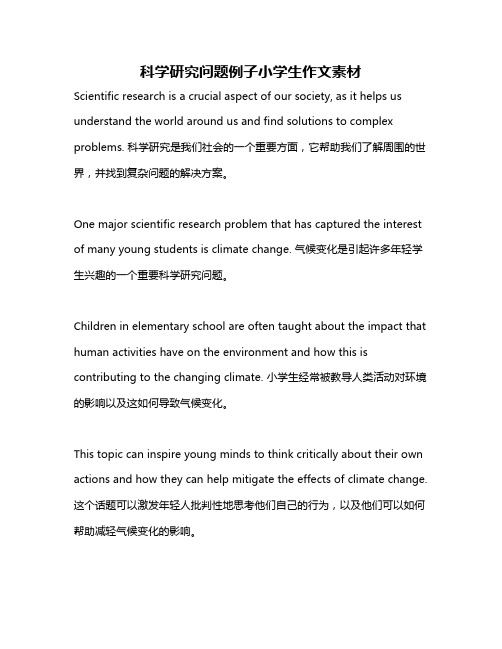
科学研究问题例子小学生作文素材Scientific research is a crucial aspect of our society, as it helps us understand the world around us and find solutions to complex problems. 科学研究是我们社会的一个重要方面,它帮助我们了解周围的世界,并找到复杂问题的解决方案。
One major scientific research problem that has captured the interest of many young students is climate change. 气候变化是引起许多年轻学生兴趣的一个重要科学研究问题。
Children in elementary school are often taught about the impact that human activities have on the environment and how this is contributing to the changing climate. 小学生经常被教导人类活动对环境的影响以及这如何导致气候变化。
This topic can inspire young minds to think critically about their own actions and how they can help mitigate the effects of climate change. 这个话题可以激发年轻人批判性地思考他们自己的行为,以及他们可以如何帮助减轻气候变化的影响。
By conducting research on climate change, students can come up with creative solutions to reduce greenhouse gas emissions and protect our planet for future generations. 通过对气候变化的研究,学生可以提出创造性的解决方案,减少温室气体排放,保护我们的星球,造福后代。
学生知识结构不平衡英语作文
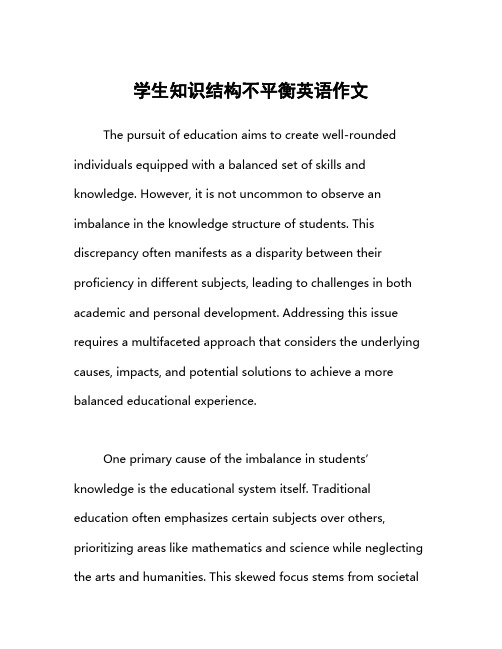
学生知识结构不平衡英语作文The pursuit of education aims to create well-rounded individuals equipped with a balanced set of skills and knowledge. However, it is not uncommon to observe an imbalance in the knowledge structure of students. This discrepancy often manifests as a disparity between their proficiency in different subjects, leading to challenges in both academic and personal development. Addressing this issue requires a multifaceted approach that considers the underlying causes, impacts, and potential solutions to achieve a more balanced educational experience.One primary cause of the imbalance in students’ knowledge is the educational system itself. Traditional education often emphasizes certain subjects over others, prioritizing areas like mathematics and science while neglecting the arts and humanities. This skewed focus stems from societalperceptions of what constitutes valuable knowledge, often driven by job market demands and economic factors. Consequently, students may excel in quantitatively rigorous subjects but struggle with creative and critical thinking skills nurtured by the humanities.Another contributing factor is the individual interests and aptitudes of students. Children naturally gravitate towards subjects they find interesting and are good at, leading to greater proficiency in those areas. While this self-directed learning is beneficial, it can result in a lack of exposure and development in less favored subjects. For instance, a student passionate about literature may invest more time reading and analyzing texts, but might neglect developing mathematical skills.Parental influence and extracurricular activities also play significant roles in shaping students’ knowledge structures. Parents who value certain disciplines may encourage theirchildren to focus on those areas, sometimes at the expense of a more balanced education. Additionally, extracurricular activities that align with students’ interests can further reinforce their strengths while sidelining weaker areas. For example, a student involved in competitive sports may prioritize physical education and teamwork over academic pursuits, leading to an imbalance.The repercussions of an imbalanced knowledge structure are multifaceted and can affect various aspects of a student’s life. Academically, students with pronounced strengths in specific subjects may excel in those areas but struggle in others, leading to uneven academic performance. This imbalance can affect college admissions and career prospects, as students may lack the comprehensive skill set required for certain fields or higher education programs.From a cognitive perspective, an imbalance in knowledge can hinder the development of a well-rounded intellect. A student proficient in logical and analytical thinking but weak increative and empathetic skills may find it challenging to navigate complex social situations or think innovatively. Conversely, a student with strong verbal and creative abilities but poor quantitative skills may struggle with problem-solving and data interpretation.Socially, an imbalanced knowledge structure can impact students’ interactions and relationships. Those with limited exposure to diverse subjects may find it difficult to engage in conversations outside their areas of expertise, leading to social isolation or a narrow worldview. Moreover, an overemphasis on certain disciplines can create undue pressure and stress, affecting students’ mental health and well-being.Addressing the imbalance in students’ knowledge structure requires a comprehensive approach involving educators, parents, and policymakers. One crucial step is to reform the educational curriculum to promote a more balanced approach to learning. This involves integrating arts, humanities,and vocational training alongside traditional academic subjects, ensuring students receive a holistic education. Schools should strive to create interdisciplinary programs that encourage students to explore and appreciate diverse fields of knowledge.Another essential measure is to foster an environment that values all areas of learning equally. Educators and parents should emphasize the importance of a well-rounded education, encouraging students to pursue interests outside their comfort zones. Providing opportunities for students to engage in varied extracurricular activities can also help balance their knowledge structure. For instance, schools can offer clubs and programs that cater to a wide range of interests, from music and drama to robotics and coding.Personalized learning plans can play a pivotal role in addressing knowledge imbalances. By tailoring education to individual students’ needs and strengths, educators can ensure that each student receives the support necessary to developtheir weaker areas. This may involve additional tutoring, mentorship programs, or adaptive learning technologies that provide customized resources and feedback.Finally, fostering a growth mindset in students can help mitigate the effects of an imbalanced knowledge structure. Encouraging students to view challenges as opportunities for growth rather than obstacles can motivate them to tackle less favored subjects with determination and resilience. Celebrating effort and progress, rather than just achievement, can instill a lifelong love of learning and a willingness to embrace a balanced education.The imbalance in students’ knowledge structure is a pressing issue that requires concerted efforts from all stakeholders in the education system. By recognizing the causes and impacts of this imbalance, and implementing strategies to promote a well-rounded education, we can help students develop into versatile individuals capable of thriving in acomplex and interconnected world. Balancing the emphasis on various subjects, fostering diverse interests, and encouraging a growth mindset are key steps towards achieving this goal. Ultimately, a balanced knowledge structure not only enhances academic performance but also equips students with the skills and perspectives needed for personal and professional success.。
我最难的学科英语作文
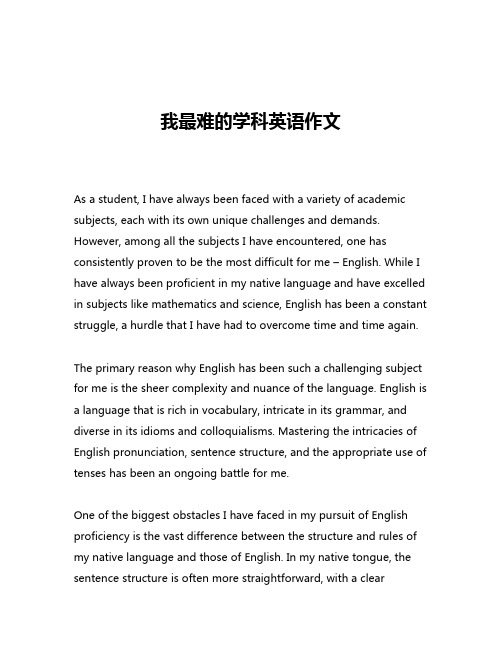
我最难的学科英语作文As a student, I have always been faced with a variety of academic subjects, each with its own unique challenges and demands. However, among all the subjects I have encountered, one has consistently proven to be the most difficult for me – English. While I have always been proficient in my native language and have excelled in subjects like mathematics and science, English has been a constant struggle, a hurdle that I have had to overcome time and time again.The primary reason why English has been such a challenging subject for me is the sheer complexity and nuance of the language. English is a language that is rich in vocabulary, intricate in its grammar, and diverse in its idioms and colloquialisms. Mastering the intricacies of English pronunciation, sentence structure, and the appropriate use of tenses has been an ongoing battle for me.One of the biggest obstacles I have faced in my pursuit of English proficiency is the vast difference between the structure and rules of my native language and those of English. In my native tongue, the sentence structure is often more straightforward, with a clearsubject-verb-object pattern. In contrast, English sentence structure can be much more convoluted, with the placement of modifiers, the use of passive voice, and the incorporation of complex clauses all adding to the difficulty.Moreover, the English language is constantly evolving, with new words and expressions being added to the lexicon on a regular basis. Keeping up with these changes and understanding the appropriate context for the use of these new terms has been a constant challenge. I often find myself struggling to find the right word to express my thoughts, or to comprehend the meaning of a phrase that is unfamiliar to me.Another significant obstacle I have faced in my study of English is the sheer volume of material that I am required to read and comprehend. In many of my other classes, the reading assignments are often straightforward and focused on the specific content of the subject matter. However, in my English courses, I am often tasked with reading complex literary works, academic articles, and other texts that demand a deep level of understanding and analysis.Navigating the nuances of literary devices, such as metaphor, symbolism, and irony, has been particularly challenging for me. I often find myself struggling to grasp the underlying meaning and significance of a text, rather than simply understanding the surface-level content.Furthermore, the ability to effectively communicate in written English has been a constant struggle for me. Crafting well-structured, coherent essays and assignments has been a daunting task, as I grapple with issues such as maintaining a consistent tone, developing a clear thesis statement, and effectively organizing my thoughts.Despite these challenges, I have not been deterred in my pursuit of English proficiency. I have worked tirelessly to improve my skills, dedicating countless hours to studying grammar rules, practicing my writing, and immersing myself in English-language media. I have sought out additional resources, such as tutoring and language-learning apps, to supplement my classroom instruction and to address my specific areas of weakness.Moreover, I have tried to embrace the challenges of learning English as an opportunity for personal growth and development. I have recognized that the mastery of a second language can open up a world of opportunities, both academically and professionally. By pushing myself to overcome the difficulties I face in my English studies, I am not only improving my language skills but also developing valuable critical thinking and problem-solving abilities that will serve me well in all aspects of my life.In conclusion, while English has been the most difficult subject for me, it has also been a source of immense personal growth and fulfillment. The challenges I have faced have only served to strengthen my determination and resilience, and I am confident that with continued effort and dedication, I will ultimately achieve the level of English proficiency that I desire. The journey may be long and arduous, but the rewards of mastering this language will be well worth the effort.。
学生选课遇到的问题英语作文
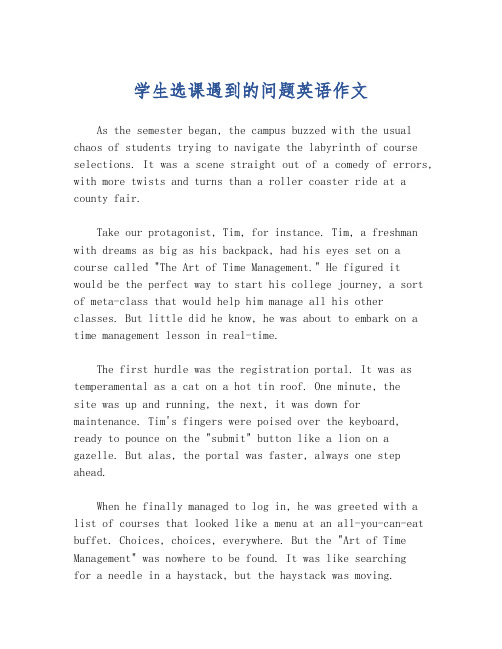
学生选课遇到的问题英语作文As the semester began, the campus buzzed with the usual chaos of students trying to navigate the labyrinth of course selections. It was a scene straight out of a comedy of errors, with more twists and turns than a roller coaster ride at a county fair.Take our protagonist, Tim, for instance. Tim, a freshman with dreams as big as his backpack, had his eyes set on a course called "The Art of Time Management." He figured it would be the perfect way to start his college journey, a sort of meta-class that would help him manage all his other classes. But little did he know, he was about to embark on a time management lesson in real-time.The first hurdle was the registration portal. It was as temperamental as a cat on a hot tin roof. One minute, thesite was up and running, the next, it was down for maintenance. Tim's fingers were poised over the keyboard, ready to pounce on the "submit" button like a lion on a gazelle. But alas, the portal was faster, always one step ahead.When he finally managed to log in, he was greeted with a list of courses that looked like a menu at an all-you-can-eat buffet. Choices, choices, everywhere. But the "Art of Time Management" was nowhere to be found. It was like searchingfor a needle in a haystack, but the haystack was moving.Undeterred, Tim decided to take a different approach. He would enroll in "The History of Pizza," a course that sounded equally intriguing and, let's be honest, delicious. But just as he clicked "enroll," a message popped up: "Course is full." It was like being told that the pizza was all out of toppings.Frustrated but not defeated, Tim turned to the "open electives" section, a catch-all for courses that didn't quite fit into any other category. He found "Advanced Basket Weaving for the Modern Age." It wasn't exactly what he had in mind, but it was available, and at this point, Tim was ready to weave a basket out of his own frustration.In the end, Tim's journey through the course selection process was a lesson in patience, perseverance, and the art of compromise. He may not have gotten the class he initially wanted, but he learned a valuable lesson: sometimes, you have to weave a few baskets before you can make a pizza.And so, with a full schedule that was as eclectic as a box of assorted chocolates, Tim prepared for the semester ahead. Who knows, maybe he'd discover a hidden talent for basket weaving, or at the very least, he'd have a good story to tell at the next family gathering. After all, life is full of surprises, and sometimes, the most unexpected classes can lead to the most memorable experiences.。
文科理科的差异英语作文
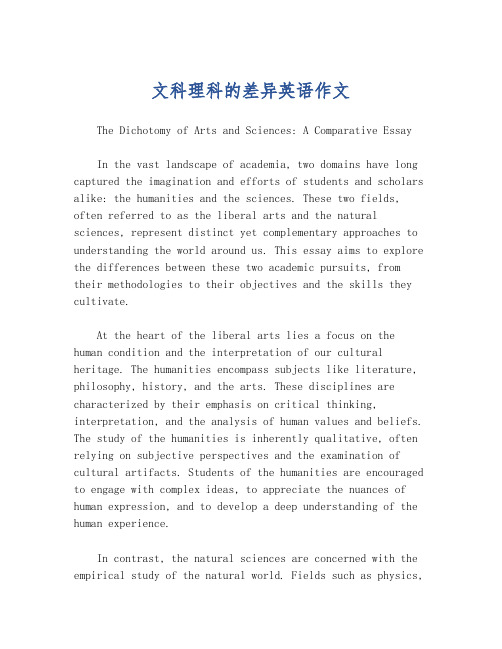
文科理科的差异英语作文The Dichotomy of Arts and Sciences: A Comparative EssayIn the vast landscape of academia, two domains have long captured the imagination and efforts of students and scholars alike: the humanities and the sciences. These two fields, often referred to as the liberal arts and the natural sciences, represent distinct yet complementary approaches to understanding the world around us. This essay aims to explore the differences between these two academic pursuits, from their methodologies to their objectives and the skills they cultivate.At the heart of the liberal arts lies a focus on the human condition and the interpretation of our cultural heritage. The humanities encompass subjects like literature, philosophy, history, and the arts. These disciplines are characterized by their emphasis on critical thinking, interpretation, and the analysis of human values and beliefs. The study of the humanities is inherently qualitative, often relying on subjective perspectives and the examination of cultural artifacts. Students of the humanities are encouraged to engage with complex ideas, to appreciate the nuances of human expression, and to develop a deep understanding of the human experience.In contrast, the natural sciences are concerned with the empirical study of the natural world. Fields such as physics,chemistry, biology, and astronomy are predicated on the scientific method, which involves the formulation of hypotheses, experimentation, and the collection of quantitative data. The sciences seek to uncover the laws and principles that govern the universe and living organisms. The approach is objective and systematic, with a strong reliance on measurable evidence and statistical analysis. Students in the sciences are trained to think logically, solve problems analytically, and apply their knowledge to real-world applications.The objectives of these two domains also diverge significantly. The humanities aim to foster a well-rounded individual with a broad understanding of society, history, and the arts. The goal is to produce graduates who are culturally literate, empathetic, and capable of engaging with diverse perspectives. On the other hand, the sciences strive to advance knowledge and technology, with the ultimate aim of improving human life and understanding the universe. Graduates from the sciences are equipped with specialized knowledge and skills that are often directly applicable to professional fields such as medicine, engineering, and research.Despite their differences, both the humanities and the sciences play crucial roles in the development of a society. The humanities provide the context and the ethical framework within which scientific discoveries are made and applied. The sciences, conversely, offer the tools and the empirical evidence necessary to address many of the challenges faced by humanity, from disease to environmental change.In conclusion, the liberal arts and the natural sciences represent two distinct yet equally valuable approaches to education and knowledge. While the humanities delve into the subjective and qualitative aspects of human culture, the sciences focus on the objective and quantitative understanding of the natural world. Both are essential to a balanced education, and they complement each other in preparing individuals to contribute to a complex and ever-changing global community.。
校园生活中的科学作文英语
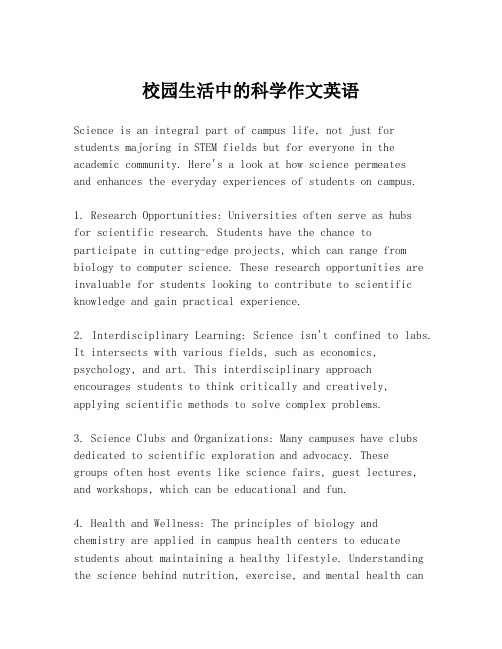
校园生活中的科学作文英语Science is an integral part of campus life, not just for students majoring in STEM fields but for everyone in the academic community. Here's a look at how science permeatesand enhances the everyday experiences of students on campus.1. Research Opportunities: Universities often serve as hubsfor scientific research. Students have the chance toparticipate in cutting-edge projects, which can range from biology to computer science. These research opportunities are invaluable for students looking to contribute to scientific knowledge and gain practical experience.2. Interdisciplinary Learning: Science isn't confined to labs. It intersects with various fields, such as economics, psychology, and art. This interdisciplinary approach encourages students to think critically and creatively, applying scientific methods to solve complex problems.3. Science Clubs and Organizations: Many campuses have clubs dedicated to scientific exploration and advocacy. Thesegroups often host events like science fairs, guest lectures, and workshops, which can be educational and fun.4. Health and Wellness: The principles of biology and chemistry are applied in campus health centers to educate students about maintaining a healthy lifestyle. Understanding the science behind nutrition, exercise, and mental health canempower students to make informed choices.5. Sustainability Initiatives: Environmental science plays a crucial role in campus sustainability efforts. Students learn about the impact of human activities on the environment andare encouraged to participate in initiatives that promote ecological balance.6. Technology Integration: The rapid advancement oftechnology is a direct result of scientific progress. Campuses are often early adopters of new tech, which can enhance learning experiences through digital tools and online platforms.7. Science in Everyday Life: From the food in the cafeteriato the materials used in construction, science is everywhere on campus. Educational programs can help students understand the scientific principles behind everyday objects and processes.8. Career Preparation: For those pursuing careers in science, the campus provides a foundation for professional development. Internships, networking events, and career services are often available to help students transition into the workforce.9. Public Outreach: Many universities engage with the publicto share scientific discoveries. Students can be involved in community outreach programs, science festivals, and public lectures, which can be rewarding experiences.10. Lifelong Learning: The curiosity and passion for sciencethat students develop on campus often extends beyond their academic years. The habit of inquiry and the joy of discovery can lead to a lifetime of learning and personal growth.In conclusion, science is not just a subject studied in isolation; it is a dynamic force that shapes campus life in diverse and profound ways. It is a catalyst for innovation, a bridge for interdisciplinary collaboration, and a key to understanding the world around us.。
学生选课的问题英语作文
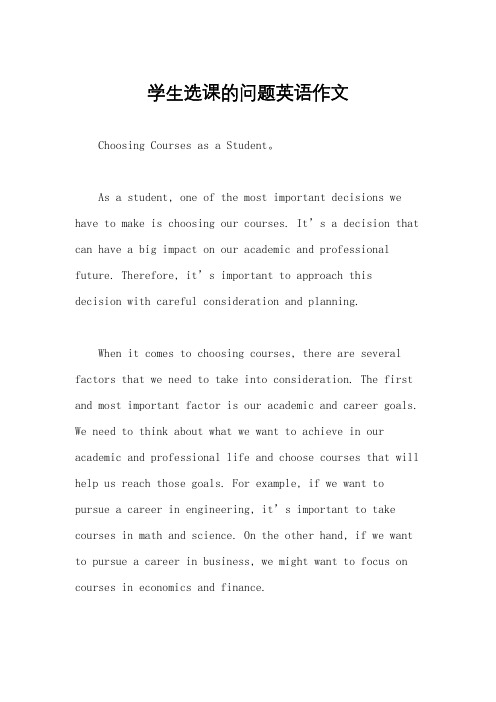
学生选课的问题英语作文Choosing Courses as a Student。
As a student, one of the most important decisions we have to make is choosing our courses. It’s a decision that can have a big impact on our academic and professional future. Therefore, it’s important to approach this decision with careful consideration and planning.When it comes to choosing courses, there are several factors that we need to take into consideration. The first and most important factor is our academic and career goals. We need to think about what we want to achieve in our academic and professional life and choose courses that will help us reach those goals. For example, if we want to pursue a career in engineering, it’s important to take courses in math and science. On the other hand, if we want to pursue a career in business, we might want to focus on courses in economics and finance.Another important factor to consider when choosing courses is our interests and passions. It’s important to choose courses that we are genuinely interested in and passionate about. This will not only make the learning process more enjoyable, but it will also help us perform better academically. When we are passionate about a subject, we are more likely to put in the effort and time needed to excel in that subject.Furthermore, we need to take into consideration the prerequisites and requirements for our major or program of study. Some courses may be required for our major, while others may be electives that we can choose based on our interests. It’s important to carefully review the course requirements for our major and make sure that we arefulfilling them with our course choices.In addition, it’s important to consider the difficulty level of the courses we are considering. We need to challenge ourselves academically, but at the same time, we need to make sure that we are not overwhelming ourselveswith a heavy course load. It’s important to find a balanceand choose a mix of challenging and manageable courses.Finally, it’s important to seek advice from academic advisors, professors, and peers when choosing courses. They can provide valuable insights and guidance based on their experience and expertise. Academic advisors can help us understand the requirements for our major and provide recommendations for courses that align with our goals and interests. Professors can provide insights into the content and difficulty level of specific courses. Peers can offer recommendations based on their own experiences and interests.In conclusion, choosing courses as a student is a decision that requires careful consideration and planning. It’s important to take into account our academic and career goals, interests and passions, major requirements, course difficulty, and seek advice from academic advisors, professors, and peers. By approaching this decision with careful consideration, we can make the most of our academic experience and set ourselves up for success in our academic and professional future.。
大学生人文学科学习和发展调查英语作文
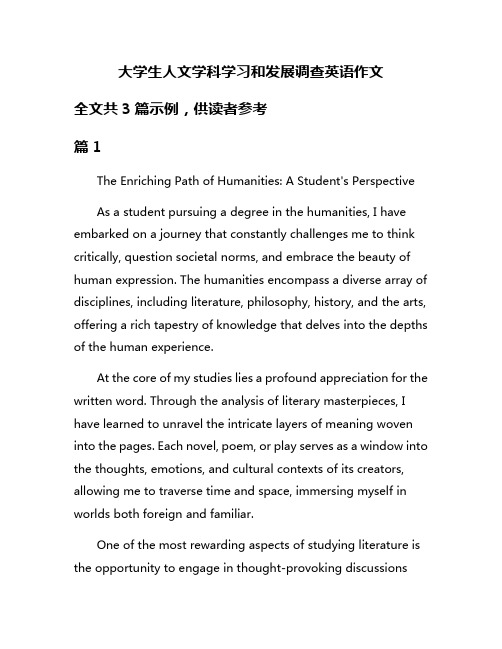
大学生人文学科学习和发展调查英语作文全文共3篇示例,供读者参考篇1The Enriching Path of Humanities: A Student's PerspectiveAs a student pursuing a degree in the humanities, I have embarked on a journey that constantly challenges me to think critically, question societal norms, and embrace the beauty of human expression. The humanities encompass a diverse array of disciplines, including literature, philosophy, history, and the arts, offering a rich tapestry of knowledge that delves into the depths of the human experience.At the core of my studies lies a profound appreciation for the written word. Through the analysis of literary masterpieces, I have learned to unravel the intricate layers of meaning woven into the pages. Each novel, poem, or play serves as a window into the thoughts, emotions, and cultural contexts of its creators, allowing me to traverse time and space, immersing myself in worlds both foreign and familiar.One of the most rewarding aspects of studying literature is the opportunity to engage in thought-provoking discussionswith my peers and professors. As we dissect the symbolism, characterization, and thematic elements of a work, our classroom becomes a vibrant arena for the exchange of ideas. We challenge one another's interpretations, offer alternative perspectives, and ultimately arrive at a deeper understanding of the human condition.Beyond literature, the study of philosophy has been a profoundly transformative experience. Grappling with the fundamental questions of existence, ethics, and the nature of knowledge has pushed me to confront my own biases and preconceptions. The writings of ancient and modern philosophers have served as guideposts, illuminating the paths of reason and logic while also exposing the complexities and contradictions inherent in the pursuit of truth.Through the lens of history, I have gained a profound appreciation for the rich tapestry of human civilization. By studying the triumphs, failures, and legacies of past societies, I have developed a deeper understanding of the forces that shape our world today. Moreover, the study of history has instilled in me a sense of humility, recognizing that our present moment is but a fleeting instance in the grand narrative of human endeavor.The arts, too, have played a vital role in my intellectual and personal growth. Whether it is the captivating brushstrokes of a Renaissance masterpiece, the haunting melodies of a classical composition, or the powerful movements of a contemporary dance performance, the arts have the unique ability to transcend language barriers and speak directly to the human soul.However, my journey through the humanities has not been without its challenges. The vastness of knowledge and the complexity of human experience can often feel overwhelming. There have been moments when I have grappled with existential questions, struggled to reconcile conflicting perspectives, or found myself lost in the labyrinth of academic discourse.Yet, it is precisely these challenges that have fueled my intellectual curiosity and personal growth. The humanities have taught me the value of embracing uncertainty, of questioning assumptions, and of approaching complex issues with nuance and empathy. Through this process, I have developed a deeper appreciation for the richness of human diversity, recognizing that our differences are not sources of division but rather opportunities for mutual understanding and growth.As I navigate the latter stages of my studies, I am acutely aware of the profound impact the humanities have had on mypersonal and professional development. The critical thinking skills, cultural awareness, and appreciation for the human experience篇2A Comprehensive Look at Humanities Studies and Career PathsAs a college student majoring in English Literature, I've come to deeply appreciate the value and importance of the humanities. These fields of study, which include subjects like literature, philosophy, history, and the arts, offer a rich exploration of human culture, thought, and expression throughout the ages. However, I'm also keenly aware of the common perception that humanities degrees are "impractical" or lack clear career paths compared to more vocational or STEM-focused programs. In this essay, I'll delve into the reasons why I believe the humanities are not only intellectually rewarding but can also lead to a wide range of fulfilling and meaningful career opportunities.To begin, let's address the elephant in the room: job prospects and earning potential. It's true that humanities majors, on average, tend to have lower early-career earnings compared to those from technical or professional fields. However, thisnarrow view fails to consider the long-term benefits and transferable skills that a well-rounded liberal arts education provides. Critical thinking, communication, research, and creative problem-solving are just a few of the invaluable assets that humanities students cultivate throughout their studies.These skills are highly prized by employers across virtually every industry, from business and marketing to education, law, journalism, and beyond. In fact, many top executives and leaders cite their liberal arts backgrounds as instrumental in developing the broad perspectives and adaptability required to navigate complex organizational challenges. The ability to analyze information from multiple angles, communicate effectively, and think outside the box are indispensable assets in our rapidly changing, globally connected world.Moreover, the humanities play a vital role in preserving and transmitting cultural heritage, fostering interpersonal understanding, and promoting ethical reasoning – all essential components of a functioning, compassionate society. By studying literature, art, history, and philosophy, we gain insights into the human condition, grappling with profound questions about our existence, values, and place in the world. This depth of understanding and appreciation for diverse perspectives isinvaluable, not just for personal growth but also for addressing the complex social, political, and ethical challenges we face as a global community.Personally, my humanities education has been an incredibly enriching and eye-opening experience. Through close reading and analysis of literary texts, I've developed a heightened sensitivity to language, symbolism, and cultural contexts – skills that have applications far beyond the academic realm. The ability to interpret and convey complex ideas, to think critically about different viewpoints, and to construct well-reasoned arguments has already proven invaluable in my coursework and daily life.Furthermore, my studies have exposed me to a diverse array of human experiences, cultures, and belief systems, fostering empathy, intellectual curiosity, and an appreciation for the richness of human expression. This broader perspective has not only enhanced my personal growth but has also prepared me to navigate and thrive in an increasingly globalized and multicultural world.As I look ahead to potential career paths, the possibilities are vast and varied. Some humanities majors go on to pursue careers in fields like education, journalism, publishing, or public relations, where strong communication and writing skills are paramount.Others find success in areas like marketing, advertising, or human resources, leveraging their ability to understand and connect with diverse audiences. Still others opt for graduate studies or professional programs in disciplines like law, business, or public policy, where the critical thinking and analytical skills honed through a humanities education are highly valued.Alternatively, many humanities students choose to forge their own entrepreneurial paths, leveraging their creativity and interdisciplinary perspectives to identify unique opportunities or start their own ventures. The freelance, consulting, and gig economies have also opened up new avenues for humanities graduates to apply their versatile skill sets in flexible and dynamic ways.In short, while the traditional career trajectories for humanities majors may be less clearly defined than those in more vocational fields, the possibilities are limited only by one's imagination, adaptability, and willingness to think creatively about how to apply their knowledge and skills.Ultimately, the value of a humanities education extends far beyond mere job prospects or earning potential. It's about cultivating a deeper understanding of ourselves and the world around us, developing the intellectual agility and empathy tonavigate complex human experiences and perspectives, and contributing to the preservation and advancement of human knowledge, culture, and expression.As I continue on my academic journey, I'm confident that my humanities background will serve me well, no matter which career path I ultimately choose. The skills and insights I've gained – the ability to think critically, communicate effectively, and appreciate diverse perspectives – are not only personally enriching but also highly transferable and increasingly sought after in our rapidly evolving, interconnected world.So, while the humanities may not offer the same clearly defined career trajectories as more vocational fields, they provide a foundation of knowledge, skills, and cultural awareness that can open doors to a multitude of rewarding and meaningful opportunities. It's up to each of us as humanities students to embrace the inherent value of our studies, to think creatively about how to apply our talents, and to have the courage and determination to forge our own unique paths towards fulfilling and impactful careers.篇3A Study on the Learning and Development of Humanities for College StudentsAs a college student majoring in English literature, I have always been passionate about the humanities subjects. The humanities, encompassing fields like philosophy, history, literature, and the arts, offer a profound exploration of the human experience, our diverse cultures, and the complexities of the world we inhabit. However, in an increasinglytechnology-driven and job-oriented society, the value and relevance of these disciplines are often questioned, and their importance in higher education is debated. Through this essay, I aim to shed light on the significance of humanities education and its role in shaping well-rounded individuals ready to tackle the challenges of the modern world.One of the core benefits of studying the humanities is the cultivation of critical thinking skills. These disciplines encourage students to analyze texts, artworks, and historical events from multiple perspectives, challenging us to question assumptions, identify biases, and form well-reasoned arguments. In an era of information overload and fake news, the ability to think critically, evaluate sources, and separate fact from fiction is invaluable. The humanities equip us with the tools to navigate the complexitiesof our world, enabling us to make informed decisions and contribute meaningfully to societal discourse.Furthermore, the humanities foster empathy and cultural awareness, essential qualities in our increasingly globalized and interconnected world. By studying literature, art, and history from diverse cultures, we gain insights into different worldviews, belief systems, and ways of life. This exposure broadens our perspectives, encourages us to challenge our preconceptions, and promotes cross-cultural understanding and respect. As global citizens, the ability to appreciate and navigate cultural differences is a vital asset, both in personal and professional realms.In addition to these intellectual and interpersonal benefits, the humanities play a crucial role in preserving and transmitting cultural heritage. The study of literature, art, and history allows us to engage with the stories, traditions, and achievements of past civilizations, ensuring their legacies are not forgotten. By understanding our roots, we can better appreciate the richness of human diversity and gain a deeper sense of our place in the world. This connection to our collective past fosters a sense of identity and belonging, vital for personal growth and societal cohesion.Despite the undeniable value of the humanities, concerns have been raised about their practical applications and career prospects. It is true that many humanities degrees do not directly translate into specific job titles or career paths. However, the skills and knowledge acquired through these studies are highly transferable and sought after in various industries. Critical thinking, effective communication, problem-solving, and cultural awareness are invaluable assets in fields like education, law, journalism, marketing, and international relations, among others.Furthermore, the humanities cultivate creativity and innovation, qualities that are increasingly valued in the modern workforce. By engaging with diverse perspectives and exploring the complexities of human experience, humanities students develop the ability to think outside the box, challenge conventions, and approach problems from unique angles. In a rapidly changing world, the capacity for original thinking and adaptability is essential for success in any field.As a student of the humanities, I have witnessed firsthand the transformative power of these disciplines. The study of literature, for instance, has not only enriched my understanding of language and storytelling but has also exposed me to profound explorations of human emotions, relationships, andexistential questions. Through the works of great authors, I have been challenged to confront complex ethical dilemmas, grapple with philosophical concepts, and reflect on the multifaceted nature of human experience.Moreover, the humanities have instilled in me a deep appreciation for diverse cultures and a commitment to promoting understanding and respect across boundaries. By studying the histories, artistic expressions, and belief systems of different societies, I have gained valuable insights into the richness of human diversity and the interconnectedness of our global community.While the practical applications of the humanities may not be as apparent as those of STEM fields, their value lies in their ability to shape well-rounded individuals equipped with essential life skills. Critical thinking, effective communication, cultural awareness, and the ability to navigate complex moral and ethical dilemmas are invaluable assets in any profession or personal endeavor.As we move forward into an increasingly complex and rapidly changing world, the importance of the humanities only grows. In an era of technological advancements, global interconnectedness, and pressing social and environmentalchallenges, we need individuals who can think critically, communicate effectively, and navigate cultural differences with empathy and understanding. The humanities play a vital role in shaping such individuals, equipping them with the knowledge, skills, and perspectives necessary to tackle the challenges of our time.In conclusion, the study of the humanities is not merely an intellectual pursuit but a transformative journey that shapes our understanding of the world, our ability to navigate its complexities, and our capacity to contribute meaningfully to society. While the practical applications of these disciplines may not be immediately apparent, their value lies in the cultivation of essential life skills and the preservation of our collective cultural heritage. As a student of the humanities, I am grateful for the opportunities these disciplines have provided me to grow intellectually, emotionally, and culturally. I firmly believe that the humanities deserve a prominent place in higher education, as they play a crucial role in shaping well-rounded, critically thinking, and culturally aware individuals ready to tackle the challenges of our ever-evolving world.。
为老师提供辩论话题英语作文

辩论话题:现代科技是否对学生的学习产生积极影响**English Content:**In the age of rapid technological advancements, the integration of modern technology into education has become a widespread phenomenon. Debates on whether modern technology positively impacts student learning are ongoing and争议不断。
While some argue that technology enhances the learning experience, others maintain that it distracts students and undermines the traditional teaching methods. This essay explores the pros and cons of modern technology in student learning, aiming to provide teachers with a debate topic that encourages critical thinking and stimulates classroom discussions.**Arguments Favoring the Positive Impact of Modern Technology:**1. **Enhanced Engagement:** Technology, especially interactive tools like smartboards and tablets, encourages student engagement by making learning more dynamic and visually appealing.2. **Access to Resources:** The internet provides students with instant access to a vast array of educational resources, enabling them to conduct independent research and expand their knowledge beyond the classroom.3. **Personalized Learning:** Technology allows teachers to customize lesson plans and teaching methods to meet the individual needs of students, thus promoting personalized learning experiences.4. **Collaborative Learning:** Collaborative tools like wikis, online forums, and video conferencing softwarefoster student collaboration, enabling them to work together on projects and share ideas seamlessly.5. **Preparation for the Future:** By exposing students to technology in the classroom, teachers are preparing them for the technology-driven world they will encounter intheir future careers.**Arguments Opposing the Positive Impact of Modern Technology:**1. **Distractions:** Technology, especially smartphones and social media, can be significant distractions forstudents, leading to decreased attention spans and a decrease in academic performance.2. **Dependency on Technology:** Overreliance on technology can make students less autonomous and capable of critical thinking, as they become accustomed to finding answers quickly through online searches instead of developing their own understanding.3. **Unequal Access:** While technology may be widely available in developed regions, many students in rural or economically disadvantaged areas lack access to the same resources, creating a digital divide that can exacerbate educational disparities.4. **Costs and Infrastructure:** The integration of technology into the classroom requires significantfinancial investment in hardware, software, and infrastructure, which may not be feasible for all schools.5. **Loss of Human Interaction:** Some argue that the excessive use of technology in the classroom can lead to a decrease in face-to-face interaction between teachers and students, undermining the social and emotional aspects of learning.In conclusion, the impact of modern technology on student learning is complex and multifaceted. While itoffers numerous benefits that enhance the learning experience, it also poses challenges that teachers need to address effectively. By exploring these pros and cons, teachers can engage students in meaningful debates that foster critical thinking and prepare them for thechallenges of the modern world.**Chinese Content:**在科技飞速发展的时代,现代科技与教育的融合已成为普遍现象。
问答式结构作文范文
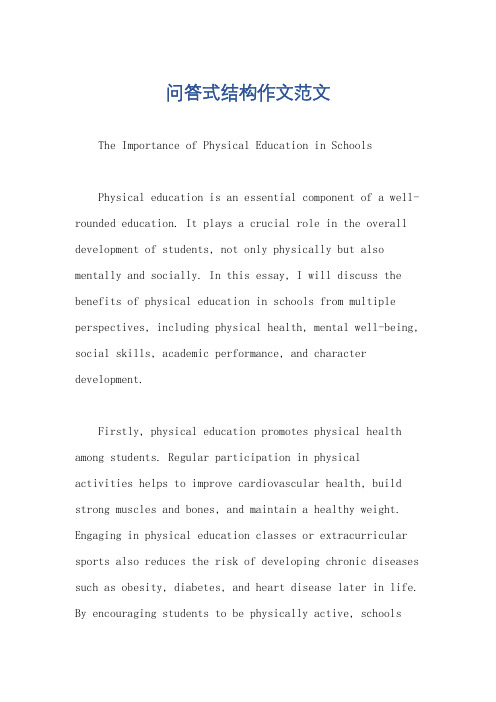
问答式结构作文范文The Importance of Physical Education in SchoolsPhysical education is an essential component of a well-rounded education. It plays a crucial role in the overall development of students, not only physically but also mentally and socially. In this essay, I will discuss the benefits of physical education in schools from multiple perspectives, including physical health, mental well-being, social skills, academic performance, and character development.Firstly, physical education promotes physical health among students. Regular participation in physicalactivities helps to improve cardiovascular health, build strong muscles and bones, and maintain a healthy weight. Engaging in physical education classes or extracurricular sports also reduces the risk of developing chronic diseases such as obesity, diabetes, and heart disease later in life. By encouraging students to be physically active, schoolscontribute to the overall well-being of their students and help them establish healthy habits that can last a lifetime.Secondly, physical education has a positive impact on mental well-being. Exercise releases endorphins, which are known as "feel-good" hormones, and can help reduce stress, anxiety, and depression. Physical activities in schools provide students with an outlet for their energy, allowing them to release tension and improve their mood. Furthermore, participating in team sports or group activities fosters a sense of belonging and camaraderie, which can boost self-esteem and improve mental resilience.In addition to physical and mental benefits, physical education also helps develop important social skills. Through team sports and group activities, students learn about cooperation, teamwork, and communication. They learnto work together towards a common goal, respect eachother's abilities, and develop leadership skills. These social skills are crucial for success in both personal and professional life, as they enable individuals tocollaborate effectively with others and navigate socialsituations with confidence.Moreover, physical education has been linked to improved academic performance. Research suggests thatregular physical activity can enhance cognitive function, attention span, and memory, which can ultimately lead to better academic outcomes. By incorporating physical education into the school curriculum, students are giventhe opportunity to engage in activities that stimulatetheir brain and enhance their learning abilities. Physical education also promotes discipline, time management, and goal-setting, which are essential skills for academic success.Lastly, physical education helps in character development. Through physical activities, students learn about perseverance, resilience, and the importance of hard work. They experience both success and failure, and learnto face challenges and overcome obstacles. Physical education teaches students valuable life lessons such asthe importance of dedication, discipline, and determination, which can contribute to their personal growth and characterdevelopment.In conclusion, physical education is a vital component of a comprehensive education system. It offers numerous benefits to students, including improved physical health, enhanced mental well-being, the development of social skills, better academic performance, and character development. By incorporating physical education into schools, we can ensure that students receive a holistic education that prepares them for success in all aspects of life.。
英语选物化生作文
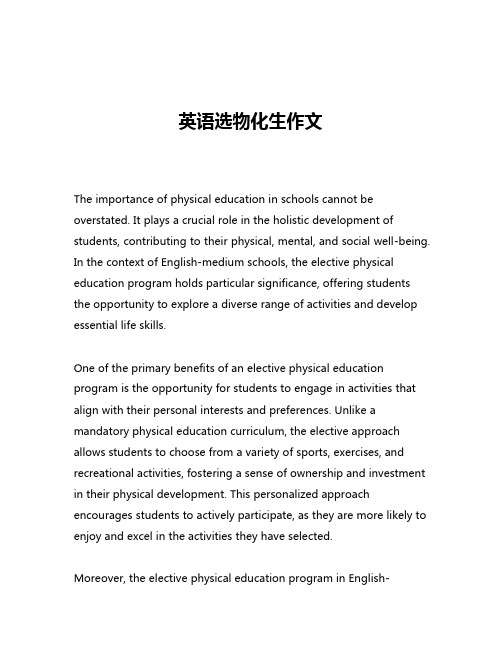
英语选物化生作文The importance of physical education in schools cannot be overstated. It plays a crucial role in the holistic development of students, contributing to their physical, mental, and social well-being. In the context of English-medium schools, the elective physical education program holds particular significance, offering students the opportunity to explore a diverse range of activities and develop essential life skills.One of the primary benefits of an elective physical education program is the opportunity for students to engage in activities that align with their personal interests and preferences. Unlike a mandatory physical education curriculum, the elective approach allows students to choose from a variety of sports, exercises, and recreational activities, fostering a sense of ownership and investment in their physical development. This personalized approach encourages students to actively participate, as they are more likely to enjoy and excel in the activities they have selected.Moreover, the elective physical education program in English-medium schools promotes the development of crucial life skills. Through the various activities offered, students can learn the importance of teamwork, communication, and leadership. Sports and group exercises require individuals to collaborate, negotiate, and compromise, skills that are highly valuable in academic, professional, and social settings. Additionally, the competitive nature of certain activities can help students develop resilience, problem-solving abilities, and the ability to handle both success and failure in a constructive manner.Another significant aspect of the elective physical education program is its contribution to the overall health and well-being of students. Regular physical activity has been shown to have numerous benefits, including improved cardiovascular health, increased muscle strength and flexibility, and enhanced cognitive function. By providing students with a diverse range of physical activities to choose from, the elective program encourages them to develop lifelong habits of physical fitness and healthy living.Furthermore, the elective physical education program in English-medium schools can serve as a platform for the exploration of different cultural and traditional forms of physical expression. For instance, students may have the opportunity to learn about and participate in activities such as yoga, martial arts, or traditional dance forms from various parts of the world. This exposure to diversephysical practices can foster a greater appreciation for cultural diversity and a deeper understanding of the global community.In addition to the tangible benefits of the elective physical education program, it also plays a crucial role in the overall educational experience of students in English-medium schools. By providing a balance between academic pursuits and physical activities, the program helps to alleviate the stress and pressure that often accompanies the rigorous academic curriculum. The opportunity to engage in physical activities can serve as a valuable outlet for students, allowing them to recharge, rejuvenate, and approach their academic work with renewed energy and focus.It is important to note that the success of the elective physical education program in English-medium schools is heavily dependent on the quality of the program's implementation and the support it receives from the school administration and the broader community. Adequate funding, access to well-equipped facilities, and the availability of knowledgeable and experienced instructors are all crucial factors that contribute to the program's effectiveness.In conclusion, the elective physical education program in English-medium schools is a vital component of a comprehensive educational experience. By offering students the freedom to choose activities that align with their interests, the program fosters thedevelopment of essential life skills, promotes physical and mental well-being, and provides a valuable counterbalance to the academic demands of the curriculum. As educational institutions continue to recognize the importance of holistic development, the elective physical education program will undoubtedly remain a crucial aspect of the learning experience for students in English-medium schools.。
英语辩论题目作文
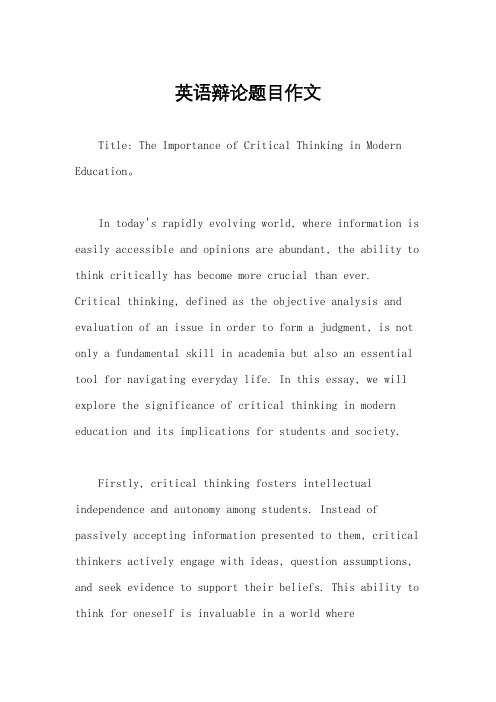
英语辩论题目作文Title: The Importance of Critical Thinking in Modern Education。
In today's rapidly evolving world, where information is easily accessible and opinions are abundant, the ability to think critically has become more crucial than ever.Critical thinking, defined as the objective analysis and evaluation of an issue in order to form a judgment, is not only a fundamental skill in academia but also an essential tool for navigating everyday life. In this essay, we will explore the significance of critical thinking in modern education and its implications for students and society.Firstly, critical thinking fosters intellectual independence and autonomy among students. Instead of passively accepting information presented to them, critical thinkers actively engage with ideas, question assumptions, and seek evidence to support their beliefs. This ability to think for oneself is invaluable in a world wheremisinformation and biased narratives abound. By encouraging students to think critically, educators empower them to make informed decisions and resist manipulation or coercion.Moreover, critical thinking promotes problem-solvingand innovation. In today's complex and interconnected world, challenges often require creative and unconventional solutions. By teaching students to approach problems analytically and systematically, educators equip them with the tools to tackle real-world issues effectively. Whetherit's addressing climate change, combating inequality, or advancing technology, critical thinkers are at theforefront of progress and change.Furthermore, critical thinking cultivates empathy and tolerance. By encouraging students to consider multiple perspectives and weigh conflicting evidence, educatorsfoster a culture of understanding and respect. In an increasingly diverse and multicultural society, the ability to empathize with others and appreciate differentviewpoints is essential for fostering harmony and cooperation. Critical thinkers are not only able toarticulate their own beliefs convincingly but also willing to listen to and learn from others with humility and open-mindedness.Additionally, critical thinking enhances communication skills. The ability to articulate ideas clearly, support arguments persuasively, and engage in respectful debate is vital in both academic and professional settings. By honing their critical thinking skills, students not only become more effective communicators but also more discerning consumers of information. In an age of digital communication and social media, where misinformation spreads rapidly and debates often descend into vitriol, the need for thoughtful and constructive dialogue has never been greater.In conclusion, critical thinking is indispensable in modern education for its role in fostering intellectual independence, promoting problem-solving and innovation, cultivating empathy and tolerance, and enhancing communication skills. As educators, it is ourresponsibility to prioritize the development of criticalthinking skills in our students, equipping them with the tools they need to succeed in an increasingly complex and uncertain world. By nurturing critical thinkers, we empower individuals to navigate the challenges of the 21st century with confidence, resilience, and integrity.。
科学词汇英文作文范文高中
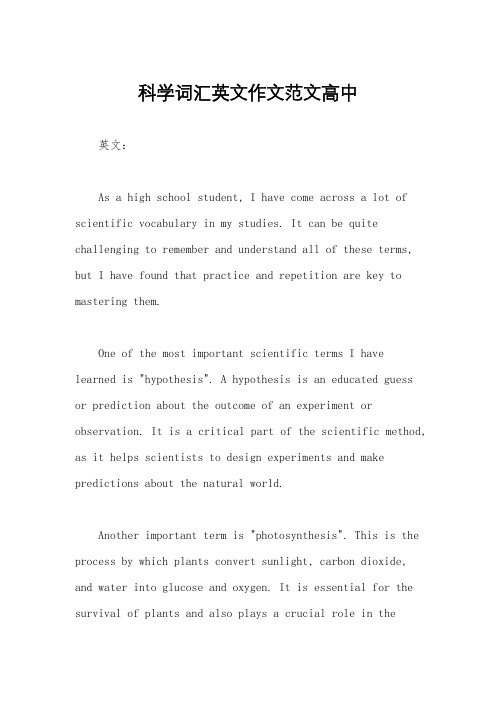
科学词汇英文作文范文高中英文:As a high school student, I have come across a lot of scientific vocabulary in my studies. It can be quite challenging to remember and understand all of these terms, but I have found that practice and repetition are key to mastering them.One of the most important scientific terms I have learned is "hypothesis". A hypothesis is an educated guessor prediction about the outcome of an experiment or observation. It is a critical part of the scientific method, as it helps scientists to design experiments and make predictions about the natural world.Another important term is "photosynthesis". This is the process by which plants convert sunlight, carbon dioxide, and water into glucose and oxygen. It is essential for the survival of plants and also plays a crucial role in theEarth's ecosystem.In addition to these terms, I have also learned about concepts such as "genetics", "evolution", and "ecology". These are all complex topics that require a lot of study and understanding, but they are fascinating and incredibly important for understanding the world around us.Overall, I believe that learning scientific vocabulary is essential for any student who wants to succeed in science. It can be challenging at times, but with practice and dedication, it is possible to master these terms and concepts.中文:作为一名高中学生,我在学习中遇到了很多科学词汇。
学业问题英语作文
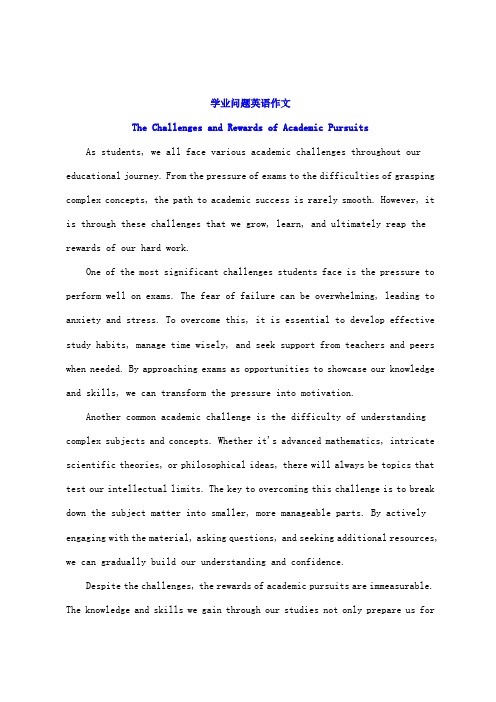
学业问题英语作文The Challenges and Rewards of Academic Pursuits As students, we all face various academic challenges throughout our educational journey. From the pressure of exams to the difficulties of grasping complex concepts, the path to academic success is rarely smooth. However, it is through these challenges that we grow, learn, and ultimately reap the rewards of our hard work.One of the most significant challenges students face is the pressure to perform well on exams. The fear of failure can be overwhelming, leading to anxiety and stress. To overcome this, it is essential to develop effective study habits, manage time wisely, and seek support from teachers and peers when needed. By approaching exams as opportunities to showcase our knowledge and skills, we can transform the pressure into motivation.Another common academic challenge is the difficulty of understanding complex subjects and concepts. Whether it's advanced mathematics, intricate scientific theories, or philosophical ideas, there will always be topics that test our intellectual limits. The key to overcoming this challenge is to break down the subject matter into smaller, more manageable parts. By actively engaging with the material, asking questions, and seeking additional resources, we can gradually build our understanding and confidence.Despite the challenges, the rewards of academic pursuits are immeasurable. The knowledge and skills we gain through our studies not only prepare us forfuture careers but also enrich our lives in countless ways. The sense of accomplishment that comes with mastering a difficult concept or achieving a high grade is a testament to our resilience and dedication. Moreover, the friendships and connections we make along the way become invaluable sources of support and inspiration.In conclusion, while academic challenges can be daunting, they are also opportunities for growth and self-discovery. By embracing these challenges with a positive mindset and a willingness to learn, we can unlock our full potential and reap the rewards of a successful academic journey.中文翻译:作为学生,我们在求学过程中都会面临各种学业挑战。
四级作文预测
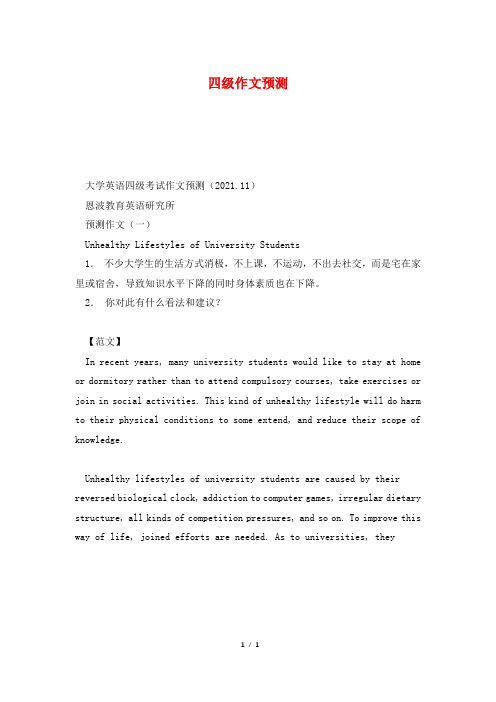
四级作文预测
大学英语四级考试作文预测(2021.11)
恩波教育英语研究所
预测作文(一)
Unhealthy Lifestyles of University Students
1.不少大学生的生活方式消极,不上课,不运动,不出去社交,而是宅在家里或宿舍,导致知识水平下降的同时身体素质也在下降。
2.你对此有什么看法和建议?
【范文】
In recent years, many university students would like to stay at home or dormitory rather than to attend compulsory courses, take exercises or join in social activities. This kind of unhealthy lifestyle will do harm to their physical conditions to some extend, and reduce their scope of knowledge.
Unhealthy lifestyles of university students are caused by their reversed biological clock, addiction to computer games, irregular dietary structure, all kinds of competition pressures, and so on. To improve this way of life, joined efforts are needed. As to universities, they
1/ 1。
关于偏科现象的一封信英语作文
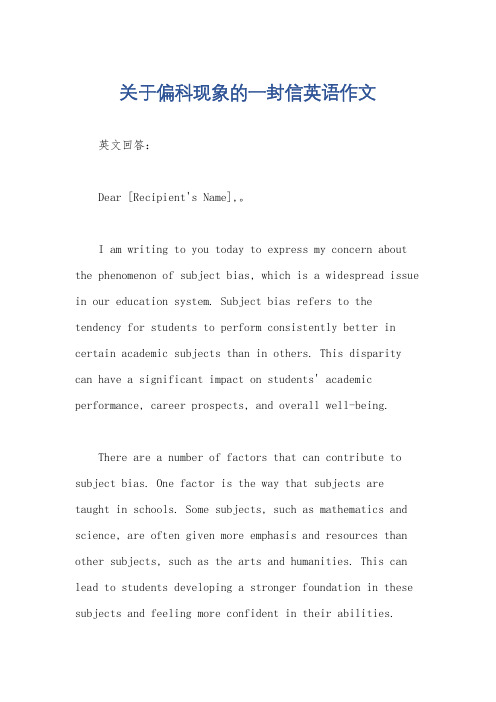
关于偏科现象的一封信英语作文英文回答:Dear [Recipient's Name],。
I am writing to you today to express my concern about the phenomenon of subject bias, which is a widespread issue in our education system. Subject bias refers to the tendency for students to perform consistently better in certain academic subjects than in others. This disparity can have a significant impact on students' academic performance, career prospects, and overall well-being.There are a number of factors that can contribute to subject bias. One factor is the way that subjects are taught in schools. Some subjects, such as mathematics and science, are often given more emphasis and resources than other subjects, such as the arts and humanities. This can lead to students developing a stronger foundation in these subjects and feeling more confident in their abilities.Another factor that can contribute to subject bias is the way that students are assessed. In many schools, students are primarily assessed through standardized tests. These tests often focus on a narrow range of skills and knowledge, which can disadvantage students who are not strong in these areas. This can lead to students feeling discouraged and less motivated to learn subjects that they do not perform well in.Subject bias can have a number of negative consequences for students. It can lead to students feeling inadequate and lacking in self-confidence. It can also lead to students avoiding or dropping out of subjects that theyfind challenging. This can have a ripple effect on their overall academic performance and career prospects.In addition to the negative impact on students, subject bias can also have a negative impact on society as a whole. When students are not exposed to a broad range of subjects, they are less likely to develop the critical thinking, problem-solving, and communication skills that areessential for success in the 21st century workforce. This can lead to a less educated and less productive workforce, which can have a negative impact on the economy and society as a whole.I believe that it is essential to address the issue of subject bias in our education system. There are a number of things that can be done to reduce subject bias, such as:Providing equal emphasis and resources to all subjects.Using a variety of assessment methods to cater to different learning styles.Encouraging students to take a broad range of subjects.Providing support and encouragement to students whoare struggling in certain subjects.By taking these steps, we can help to ensure that all students have the opportunity to reach their full potential, regardless of their individual strengths and weaknesses.Thank you for your time and consideration.Sincerely,。
